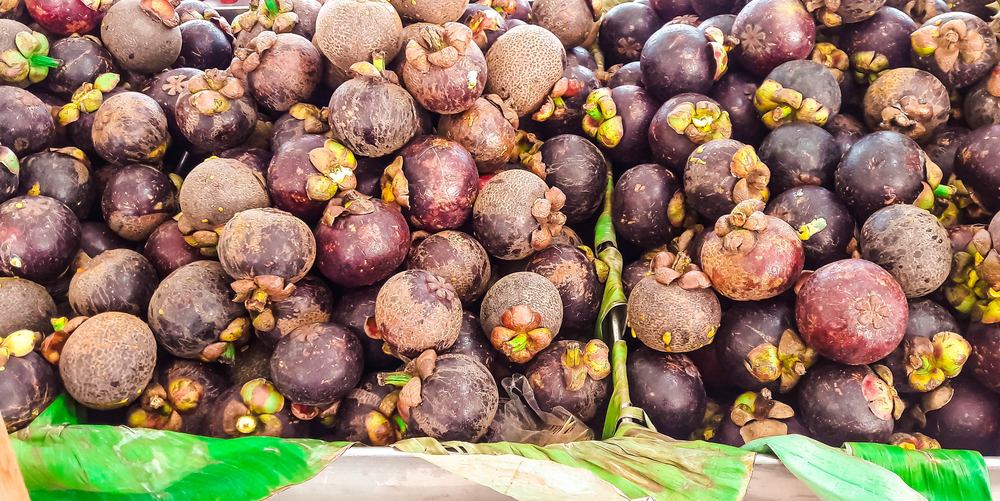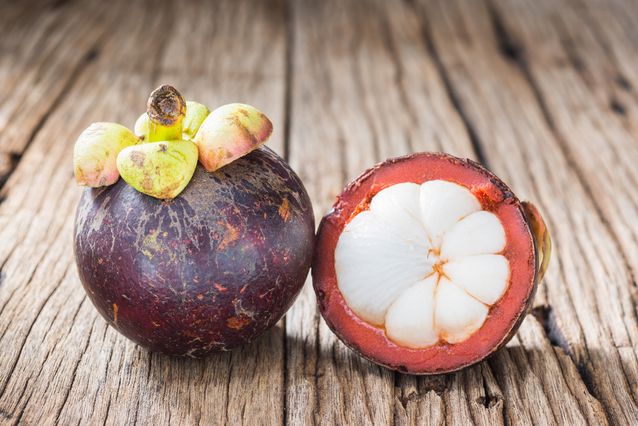
If Durian is the King of Fruit, Mangosteen had secured the title as the Queen of Fruit. Apparently, the fruit is so delicious; Queen Victoria once offered a reward of 100 pound sterling to anyone who could deliver to her the fresh fruit. A British-born Malaysian author Desmond Tate also wrote that “By popular acclaim, the mangosteen is held to be the most delectable of all the tropical fruits, and it has been proclaimed their queen. There is no doubt about the luxury of its taste. It has won unstinted praise down the ages from all who have countered it.”
Fascinating, isn’t it?
Mangosteen is a native plant to Sunda Islands and Moluccas of Indonesia. The fruit is highly valued for its juicy, delicate texture and slightly sweet and sour flavor, and it is easy to find the ripen fruits here in Indonesia. The mangosteen has been cultivated in Java, Sumatera, mainland Southeast Asia, and the Philippines since ancient times. The plant must be grown in consistently warm conditions, as exposure to temperatures below 0 degree Celsius for prolonged periods will usually kill a mature plant.
The flesh of mangosteen fruit is sweet and tangy, juicy, a little bit fibrous, with fluid-filled vesicles (like the flesh of citrus fruits), with an inedible, deep reddish-purple colored rind (exocarp) when ripe. The size is slightly smaller than an apple with a reddish purple hard outer skin and a green calyx. The flower-shaped raised marks at the base of the fruit corresponds the number of segments contained inside. It usually consists of 5 to 6 segments. The flavor of fresh mangosteen resembles the combination of lychee, peach, strawberry, and pineapple.

To open a mangosteen, the shell can be scored with a fruit knife, pried gently along the score with the thumbs until it cracks, and then pulled apart to reveal the fruit. Be careful during peeling of ripe fruits as the purple exocarp juice may stain skin or fabric.
Health benefits
Not only delicious, Mangosteen has been known as a fruit that has many health benefits; that is why it’s always on demand. It has been used to naturally treat a wide variety of health concerns for centuries by the people Southeast Asia. Benefits include being high in fiber yet low in calories, as well as having a good serving of vitamin C. And there are more benefits that you can get from this delicious fruit, such as:
- Mangosteen fights cancer
The fruit is said to contain at least 20 known xanthones, and the majority of those are found in the fruit wall. Findings from a 2008 research by the Gifu International Institute of Biotechnology in Japan showed that one xanthone from mangosteen in particular, known as alpha-Mangostin, was found to have a cancer-preventive effect on animal subjects. The ability of xanthones to both prevent and treat cancer have been demonstrated in different stages of cancer formation, including initiation, promotion and progression. - Mangosteen lowers blood sugar
Mangosteen can be a helpful way to prevent and keep diabetes under control because it helps maintain normal blood sugar levels. The ability is said to come from its tannic acid and even more so from its oligomeric proanthocyanidin complexes (OPCs). - Mangosteen reduces cholesterol
Diet rich in mangosteen is helpful in reducing the level of cholesterol in human body. It also helps to control the level of triglycerides to take care of proper working of human heart. - Mangosteen as anti-inflammatory
Mangosteen contains anti-inflammatory properties which is highly beneficial for people who suffer from sciatica pains which cannot be controlled by drug treatment.
Not only the fruit, mangosteen peel also has many health benefits. In Indonesia there are also many brands selling the extract of mangosteen peel in the forms of herbal drink and medicine; so you don’t have to eat the raw mangosteen peel to get the benefits.
- Mangosteen peel has anti-microbial properties which are very effective against Staphylococcus aureus. This makes mangosteen skin good to be consumed by people with low immunity, such as tuberculosis and HIV/AIDS patients.
- The fiber in mangosteen peel helps prevent constipation. The fiber gives more mass to the stool, and it also absorbs water from outside of the colon.
- Antioxidants in mangosteen peel can maintain the elasticity of blood vessels, preventing it from early atherosclerosis which could result in stroke and other thrombosis-related diseases. The antioxidants also protect the intestines mucous layers so the mucous layer would not in direct contact with the toxins, thus preventing the colon cancer.
- Mangosteen peel also contains vitamin A, which is very good for vision. Vitamin A protects retina and sharpen vision, and preventing us from getting xeropthalmia (lack of vision in dim/dark light).
Have you ever tasted mangosteen fruit? If you’ve never tasted a mangosteen, then you’ve never tasted the most exquisite fruit of the tropics!





